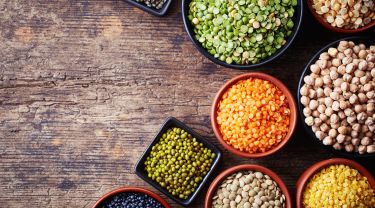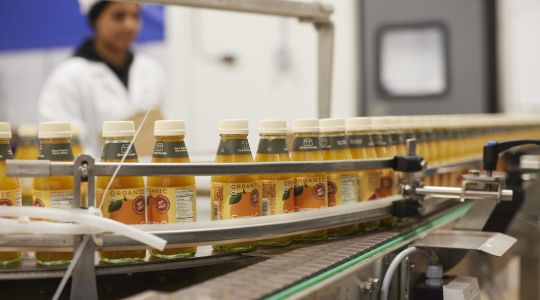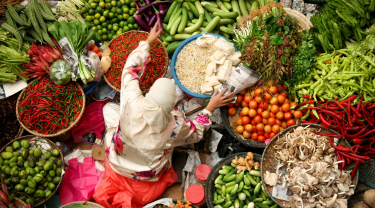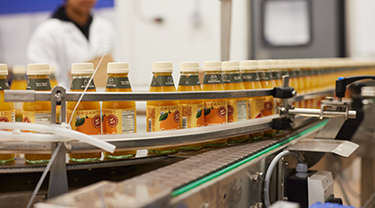
Organic food agreements open global markets to Canadian exporters
Author details
Roberto Bagnato
Former Marketing business partner, Indo-Pacific strategy
In this article:
- What are organic equivalency arrangements?
- Canada’s nine organic equivalency arrangements
- JCOEA gives Canadian organic exporters access to Japan
- CTOEA eases Canadian organic food exports to Taiwan
- CSKOEA opens the door for Canadian organic food exports to South Korea
- Navigating the challenges of exporting organics
- How Canadian organic food exporters can differentiate their products
- EDC, TCS and COTA can help Canadian agri-food exporters seize organic opportunities
- Interested in growing your organic food business in the Indo-Pacific?
Organic foods continue to gain popularity in the Indo-Pacific region, with demand driven by growing populations, higher incomes and a shift towards healthier eating habits. According to a recent report by Market Data Forecast, the organic food market in this part of the world is projected to grow to US$95.9 billion by 2029—almost double the market size in 2024.
Another report, by Grandview Research, noted that Asia-Pacific’s organic edible nuts and seeds market, which generated US$8.33 billion in revenue in 2023, is expected to hit US$19 billion by 2030.
This growing appetite for organic food, combined with an increasing number of organic equivalency arrangements between Canada and certain markets in this region, translates to even greater opportunities for Canadian organic food producers and processors.
In 2022, these businesses exported a total of $554 million in organic fruits, vegetables and processed foods, up from $417 million in the previous year, according to the Canada Organic Trade Association (COTA).
“The Indo-Pacific region represents one of the fastest-growing markets for Canada’s organic food exports, with growth driven by a number of factors that include increasing awareness about health and cleaner food options, growing concerns over pesticides, rising incomes and an expanding base of younger, more informed consumers,” says Peter Ng, global trade director for the Indo-Pacific region at Export Development Canada (EDC).
“Organic equivalency arrangements have made it easier for Canadian organic exporters to enter these markets,” Ng says.

What are organic equivalency arrangements?
Organic equivalency arrangements (OEAs) are trade arrangements between markets that recognize each other’s organic regulatory systems and standards as being equivalent. This allows products that have been certified as organic in one country to be sold as organic in the other country without requiring additional certification. For exporters, this reduces costs, lowers trade barriers and simplifies export processes.
Canada’s nine organic equivalency arrangements
As of 2025, Canada has nine organic equivalency arrangements, including three in the Indo-Pacific region:
- Canada–Costa Rica Organic Equivalency Arrangement (CCROEA)
- Canada–Mexico Organic Equivalency Arrangement (CMOEA)
- Canada–South Korea Organic Equivalency Arrangement (CSKOEA)
- Canada–Switzerland Organic Equivalency Arrangement
- Canada–Taiwan Organic Equivalency Arrangement (CTOEA)
- European Union–Canada Organic Equivalency Arrangement (EUCOEA)
- Japan–Canada Organic Equivalency Arrangement (JCOEA)
- United Kingdom–Canada Organic Equivalence Arrangement (UKCOEA)
- United States–Canada Organic Equivalence Arrangement (USCOEA)
The Japan OEA was the first organic equivalency arrangement in the Indo-Pacific region, signed in 2014, followed by Taiwan in 2020 and South Korea in 2023.
Tia Loftsgard, executive director at COTA, says it’s important for Canadian organic food businesses to understand all the terms and conditions in each OEA, particularly when it comes to what’s covered and what’s not. For example, some arrangements cover all organic products—processed and unprocessed—while others apply only to specific categories, or prohibit specific practises allowed in a trade partner’s organic standards.
Some OEAs include “critical variances” that call out significant differences between the participating countries’ organic standards or regulatory requirements of the two countries. These variances are considered critical because they prevent full alignment between standards, says Loftsgard.
JCOEA gives Canadian organic exporters access to Japan
Japan has been a strong, long-standing trade partner for Canada, with a well-developed organic sector and a grocery retail industry valued at US$198 billion in 2023, according to a United States Department of Agriculture (USDA) report. The country’s retail landscape is shifting, notes Ng, with online sales growing and major retailers expanding their organic food offerings.
“The Japanese market offers tremendous opportunities, but branding and quality assurance are key,” he says. “Canadian organic products stand out for their premium quality, but they must align with local preferences to succeed.”
The Japan-Canada Organic Equivalency Arrangement (JCOEA)—established in 2014 and the oldest OEA in the Indo-Pacific—has facilitated the smooth export of Canadian organic goods and is regularly updated to cover more products. For example, it was recently revised to include organic meat and alcoholic beverages such as organic wine.
Key JCOEA features:
- Its broad scope covers fresh produce, processed organic foods, organic livestock and meat, and organic alcoholic beverages.
- Canadian organic products certified under the Canadian Organic Regime (COR) can be sold in Japan as organic without additional certification.
- Canada must ensure that certified products comply with Japan’s agricultural standards.
CTOEA eases Canadian organic food exports to Taiwan
Taiwanese consumers prioritize food safety and origin, making Canada’s reputation for clean, high-quality food a major selling point. According to the USDA, Taiwan’s food and beverage retail market generated US$9.8 billion in sales 2023. Taiwanese consumers are increasingly health-conscious, said the report, and “tend to be less concerned about cost when shopping for natural and organic foods.”
Taiwan’s high urbanization rate and growing middle class present a significant opportunity for packaged organic goods, ready-to-eat meals and snack foods. But labelling and certification compliance remain critical for successful market entry into this export-driven economy, says Loftsgard.
Signed in 2020, the Canada-Taiwan Organic Equivalency Arrangement (CTOEA) is one of Canada’s most comprehensive organic equivalency arrangements, covering a wide range of products. This broad scope provides a competitive edge over other markets where organic categories are more restricted.
Key CTOEA features:
- Covers processed and fresh organic foods, organic livestock and meat, and organic aquaculture products such as fish and seafood.
- Canadian organic products certified under COR can be labelled and sold as organic in Taiwan without additional certification. Conversely, Taiwanese products certified as organic under Taiwan’s regulations are recognized in Canada.
- CTOEA calls for strict chemical residue testing and compliance. To comply with Taiwan’s very stringent food safety standards, Canadian exporters must ensure that residue testing results meet Taiwan’s limits before shipping.
- Importers—not exporters—bear the legal responsibility for ensuring compliance with residue limits. They risk losing their import status if products are found to exceed maximum residue levels.
- Organic products must meet Taiwan’s labelling regulations, including packaging in Mandarin and English, as well as displaying the Taiwanese organic certification logo, even for products that are COR-certified.
CSKOEA opens the door for Canadian organic food exports to South Korea
South Korea’s organic food sector continues to expand as consumers seek healthier, high-quality food options. The country’s aging population, high per-capita income and increasing focus on food safety make it an attractive market for Canadian organic products.
In 2023, South Korea—the 13th-largest economy in the world—imported approximately US$20.1 billions’ worth of consumer-oriented agricultural products, according to the USDA.
“Canadian organic products enjoy a strong reputation in South Korea, but there’s still significant room for growth,” says Joy Rankothge, EDC’s chief representative in South Korea. “The equivalency arrangement removes a major trade barrier and should encourage more exporters to enter the market."
While South Koreans enjoy a relatively higher per-capita income, they still tend to be price-conscious, says Rankothge.
“The price has to be right and when a product comes with a premium price, there has to be a good reason for it,” he says. “In the case of Canadian organic food, just the fact that it’s Canadian would be considered, by many South Koreans, to be a compelling reason to buy it. But it also has to be backed by quality.”
The Canada-South Korea Organic Equivalency Arrangement (CSKOEA), signed in 2023, allows Canadian organic processed foods to enter the market without additional certification. But fresh organic products still require South Korean certification, creating an area for potential expansion in the future.
Key CSKOEA features:
- The arrangement’s scope is limited, compared to OEAs with Japan and Taiwan, covering only processed organic products and excluding aquaculture products.
- Fresh produce and bulk organic commodities such as wheat and grains still require certification under Korean organic standards.
- Korean authorities place strict requirements on labelling, packaging and residue testing.
Navigating the challenges of exporting organics
While Canada’s organic equivalency arrangements simplify trade, challenges remain. Regulatory differences can add a layer of complexity for Canadian food exporters. In South Korea, for example, labels must comply with specific formats for best-before dates.
Moonho Lee, EDC’s co-ordinator in South Korea, says consumers in that country place a high value on how products are designed and packaged. When they’re shopping for organic foods, they expect packaging that conveys premium quality and clean ingredients.
The prevalence of intermediaries, like distributors and agents, in South Korea and Japan is another challenge. This middle layer can be hard to crack, in large part, because there’s still a widespread preference for dealing with domestic partners.
One way that Canadian exporters can overcome this barrier is by selling their products through a Canada-based distributor with established local market connections, says Rankothge.
“Or, if you’re already selling to a retailer in Canada or the United States that has a presence in your target Indo-Pacific market, then look into exporting your product through that retailer,” he says, adding, “It’s also a good idea for Canadian exporters to attend trade missions and food shows, particularly those focused on their target countries.”
For those interested in South Korea, for example, the annual Seoul Food and Hotel exhibition presents opportunities to meet buyers and potential partners.
How Canadian organic food exporters can differentiate their products
Ng says Canadian organic food exporters looking to sell to the Indo-Pacific must also overcome intense competition from other countries.
- The United States and Australia, which have long-standing trade agreements in the region, are key competitors.
- In Japan, European organic food—particularly from France and Germany—have long been favourites among consumers.
“Canadian businesses must differentiate through branding, organic integrity and by leveraging partnerships with major Japanese retailers,” says Ng. “Most importantly, they need to be well-informed about the business, regulatory and cultural environment in the countries (where) they’re looking to export.”
EDC, TCS and COTA can help Canadian agri-food exporters seize organic opportunities
Many Canadian businesses work closely with EDC, which draws on our on-the-ground experts and extensive local network to provide market knowledge and connections to the right people. EDC is part of the Government of Canada’s trade ecosystem of experts led—by the Trade Commissioner Service (TCS)—available to help Canadian exporters save time, learn more about their target markets and identify the capital they need to grow.
In Japan, TCS has a team of approximately 50 trade professionals stationed in Tokyo, Sapporo and Osaka. The governments of Alberta, British Columbia, Ontario, Quebec and Saskatchewan also have trade offices in Japan. Alberta, BC, Ontario and Quebec also have promotion teams on the ground in South Korea to help Canadian exporters.
One company, Taste of Nature in Markham, ON, successfully penetrated the U.S., European and Asian markets by tapping into EDC’s market intelligence and expertise in trade finance and risk management.
EDC also brokered meetings between Taste of Nature and local market players, including buyers, partners, distributors and e-commerce channels. Our credit insurance provided protection for the company’s global sales activities.
COTA is another critical resource for Canadian organic food exporters. In addition to providing guidance on exporting and chairing the technical committee on OAEs, COTA has direct sightlines to emerging or potential markets for organic food exporters. The Ottawa-based, not-for-profit organization works closely with the Canada Food Inspection Agency (CFIA) to determine which countries to consider for OEAs, as well as the critical variances required to ensure fair opportunities for Canadian exporters.
“On an annual basis, we have a conversation with CFIA where we share an industry perspective on which markets make sense for Canadian organic food exporters and which markets may be too small to consider,” says Loftsgard. “The goal, ultimately, is to make sure we’re finding viable export markets for Canadian organic foods.”
Interested in growing your organic food business in the Indo-Pacific?
Connect with EDC and watch your business flourish on the international stage.
Answer a few questions about your company to learn more about how EDC can help you plan, connect and fuel your expansion in the Indo-Pacific.















